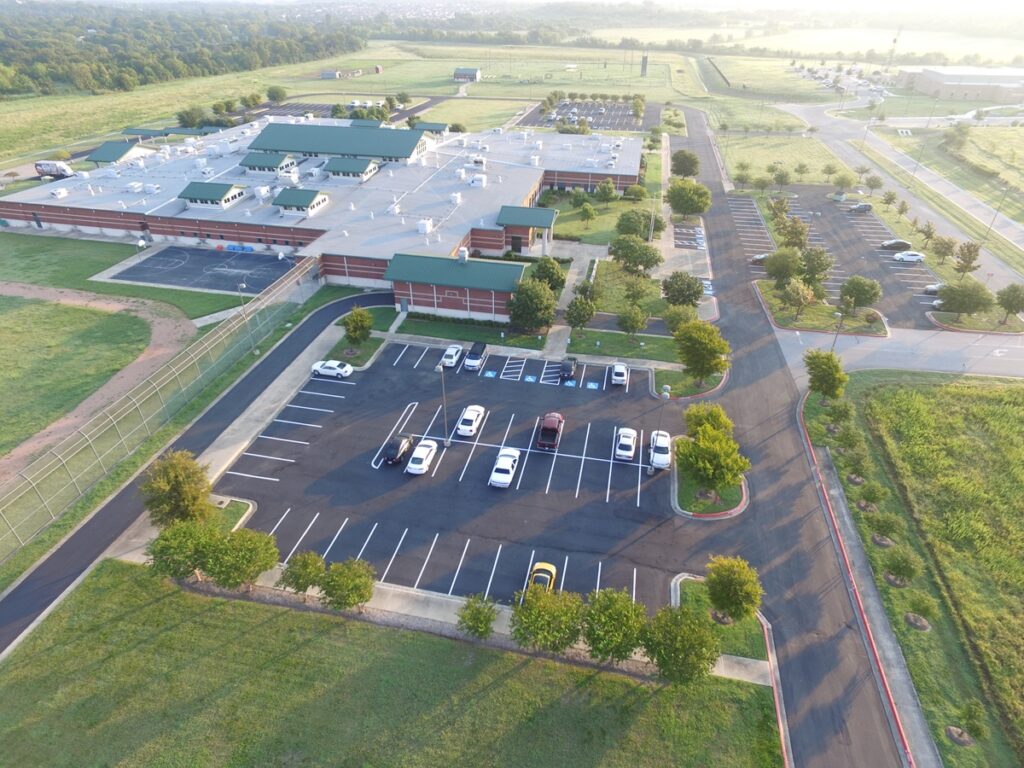
Air quality, greenhouse gases and recycling are all topics that receive a great deal of interest in the media and scientific circles, and these topics are also considered to be of major importance by many American citizens. However, most people do not realize the many ways that asphalt pavement, and asphalt paving, can contribute to cleaner air and reduced greenhouse gases — or that it is 100-percent recyclable. Here are a few reasons why asphalt contributes to cleaner air and that asphalt is an environmentally friendly choice for all types of paving needs.
Asphalt Contributes to Cleaner Air – Asphalt Production
It takes approximately 20 percent less energy to manufacture asphalt and construct asphalt pavements than is used for other types of pavement, according to research conducted by the American Society of Civil Engineers. Lower fuel consumption translates into lower levels of carbon dioxide and similar greenhouse gases. Furthermore, the asphalt industry voluntarily began reducing plant emissions almost 50 years ago. Since 1970, production has risen by 250 percent, but emissions have been reduced by 97 percent. In fact, emissions from asphalt plants are viewed by the EPA as having only a minor impact on air quality.
Traffic and Asphalt Pavement
Asphalt pavement can help drivers save fuel in two important ways. First, asphalt pavements are smooth, and studies have shown that fuel consumption can be 4.5 percent lower for a vehicle driving on a smooth road than for the same vehicle driving on rough pavement. Second, asphalt pavement requires less time to install or repair, so traffic delays and road closures can be kept to a minimum. Much asphalt work can be performed during off-peak hours as well. Since traffic jams result in excess emissions from idling vehicles, getting the area open to traffic quickly helps reduce emissions.
Asphalt and the Heat Island Effect
Many cities are subject to a phenomenon known as the heat island effect. During the height of summer, cities can be as much as 10 degrees Fahrenheit hotter than the surrounding countryside. Although no single factor is responsible for the heat island effect, pavement types can be a contributing factor. For example, porous asphalt pavements are known to reduce nighttime surface temperatures better than impervious concrete pavements. Scientists are continuing to explore ways to use asphalt pavement to combat heat retention in urban areas. Reducing or eliminating the heat island effect can reduce the amount of energy used for cooling buildings, thereby helping reduce greenhouse gases.
Asphalt’s Recyclability
In terms of tonnage, asphalt pavement is the most recycled material in America. Every scrap of asphalt pavement can be recycled, keeping it out of landfills. A great deal of old asphalt pavement is recycled to make new pavement, and since asphalt is a petroleum-based product, recycling drastically reduces the amount of new oil that is needed for production. Furthermore, asphalt pavement does not leach any toxic or harmful chemicals into groundwater or the soil. In fact, it is so safe that many fisheries, public water reservoirs and hazardous-waste landfills are lined with asphalt.
Learn More About the Benefits of Asphalt
Alpha Paving is a full-service asphalt paving company in Austin and serving most of Central Texas. Our services include asphalt paving, asphalt resurfacing, sealcoating, parking lot striping, street maintenance, road construction, asphalt repairs and pavement markings. We also provide a full range of concrete services. Our customer base includes numerous shopping centers, apartment complexes, HOAs, religious institutions, educational facilities, airports, municipalities, subdivisions, office parks, hotels, health care facilities, restaurants, retailers and manufacturing facilities. We have the experience and skills to deliver outstanding workmanship at competitive prices. If you have more questions about how Asphalt Contributes to Cleaner Air, call us at (512) 677-9001 or fill out the convenient online form to receive a free, no-obligation quote.




